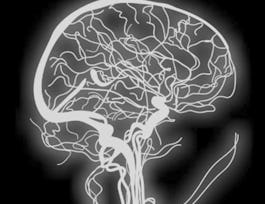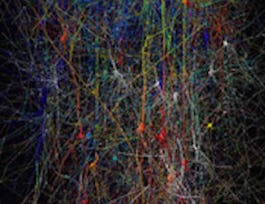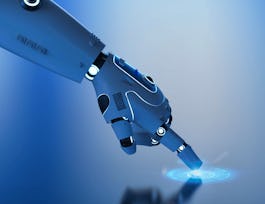This course provides an introduction to basic computational methods for understanding what nervous systems do and for determining how they function. We will explore the computational principles governing various aspects of vision, sensory-motor control, learning, and memory. Specific topics that will be covered include representation of information by spiking neurons, processing of information in neural networks, and algorithms for adaptation and learning. We will make use of Matlab/Octave/Python demonstrations and exercises to gain a deeper understanding of concepts and methods introduced in the course. The course is primarily aimed at third- or fourth-year undergraduates and beginning graduate students, as well as professionals and distance learners interested in learning how the brain processes information.


Computational Neuroscience
Taught in English
Some content may not be translated
128,574 already enrolled
(1,054 reviews)
Skills you'll gain
Details to know

Add to your LinkedIn profile
9 quizzes
See how employees at top companies are mastering in-demand skills


Earn a career certificate
Add this credential to your LinkedIn profile, resume, or CV
Share it on social media and in your performance review

There are 8 modules in this course
This module includes an Introduction to Computational Neuroscience, along with a primer on Basic Neurobiology.
What's included
6 videos6 readings2 quizzes
This module introduces you to the captivating world of neural information coding. You will learn about the technologies that are used to record brain activity. We will then develop some mathematical formulations that allow us to characterize spikes from neurons as a code, at increasing levels of detail. Finally we investigate variability and noise in the brain, and how our models can accommodate them.
What's included
8 videos3 readings1 quiz
In this module, we turn the question of neural encoding around and ask: can we estimate what the brain is seeing, intending, or experiencing just from its neural activity? This is the problem of neural decoding and it is playing an increasingly important role in applications such as neuroprosthetics and brain-computer interfaces, where the interface must decode a person's movement intentions from neural activity. As a bonus for this module, you get to enjoy a guest lecture by well-known computational neuroscientist Fred Rieke.
What's included
6 videos2 readings1 quiz
This module will unravel the intimate connections between the venerable field of information theory and that equally venerable object called our brain.
What's included
5 videos2 readings1 quiz
This module takes you into the world of biophysics of neurons, where you will meet one of the most famous mathematical models in neuroscience, the Hodgkin-Huxley model of action potential (spike) generation. We will also delve into other models of neurons and learn how to model a neuron's structure, including those intricate branches called dendrites.
What's included
7 videos2 readings1 quiz
This module explores how models of neurons can be connected to create network models. The first lecture shows you how to model those remarkable connections between neurons called synapses. This lecture will leave you in the company of a simple network of integrate-and-fire neurons which follow each other or dance in synchrony. In the second lecture, you will learn about firing rate models and feedforward networks, which transform their inputs to outputs in a single "feedforward" pass. The last lecture takes you to the dynamic world of recurrent networks, which use feedback between neurons for amplification, memory, attention, oscillations, and more!
What's included
3 videos2 readings1 quiz
This module investigates models of synaptic plasticity and learning in the brain, including a Canadian psychologist's prescient prescription for how neurons ought to learn (Hebbian learning) and the revelation that brains can do statistics (even if we ourselves sometimes cannot)! The next two lectures explore unsupervised learning and theories of brain function based on sparse coding and predictive coding.
What's included
4 videos2 readings1 quiz
In this last module, we explore supervised learning and reinforcement learning. The first lecture introduces you to supervised learning with the help of famous faces from politics and Bollywood, casts neurons as classifiers, and gives you a taste of that bedrock of supervised learning, backpropagation, with whose help you will learn to back a truck into a loading dock.The second and third lectures focus on reinforcement learning. The second lecture will teach you how to predict rewards à la Pavlov's dog and will explore the connection to that important reward-related chemical in our brains: dopamine. In the third lecture, we will learn how to select the best actions for maximizing rewards, and examine a possible neural implementation of our computational model in the brain region known as the basal ganglia. The grand finale: flying a helicopter using reinforcement learning!
What's included
4 videos2 readings1 quiz
Instructors


Offered by
Recommended if you're interested in Machine Learning

Johns Hopkins University

Hebrew University of Jerusalem

Coursera Project Network
Why people choose Coursera for their career




Learner reviews
Showing 3 of 1054
1,054 reviews
- 5 stars
71.06%
- 4 stars
22.10%
- 3 stars
4.17%
- 2 stars
1.80%
- 1 star
0.85%
New to Machine Learning? Start here.

Open new doors with Coursera Plus
Unlimited access to 7,000+ world-class courses, hands-on projects, and job-ready certificate programs - all included in your subscription
Advance your career with an online degree
Earn a degree from world-class universities - 100% online
Join over 3,400 global companies that choose Coursera for Business
Upskill your employees to excel in the digital economy
Frequently asked questions
Access to lectures and assignments depends on your type of enrollment. If you take a course in audit mode, you will be able to see most course materials for free. To access graded assignments and to earn a Certificate, you will need to purchase the Certificate experience, during or after your audit. If you don't see the audit option:
The course may not offer an audit option. You can try a Free Trial instead, or apply for Financial Aid.
The course may offer 'Full Course, No Certificate' instead. This option lets you see all course materials, submit required assessments, and get a final grade. This also means that you will not be able to purchase a Certificate experience.
When you purchase a Certificate you get access to all course materials, including graded assignments. Upon completing the course, your electronic Certificate will be added to your Accomplishments page - from there, you can print your Certificate or add it to your LinkedIn profile. If you only want to read and view the course content, you can audit the course for free.
You will be eligible for a full refund until two weeks after your payment date, or (for courses that have just launched) until two weeks after the first session of the course begins, whichever is later. You cannot receive a refund once you’ve earned a Course Certificate, even if you complete the course within the two-week refund period. See our full refund policy.



